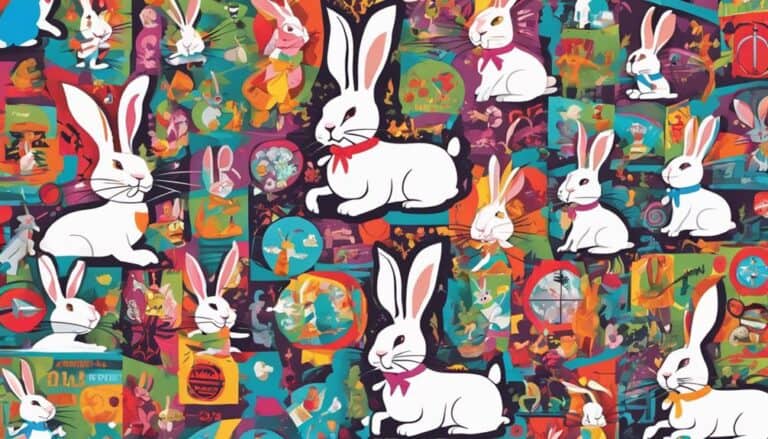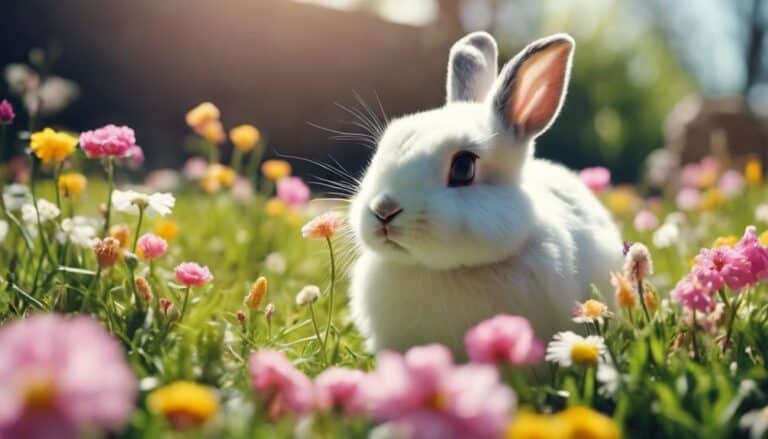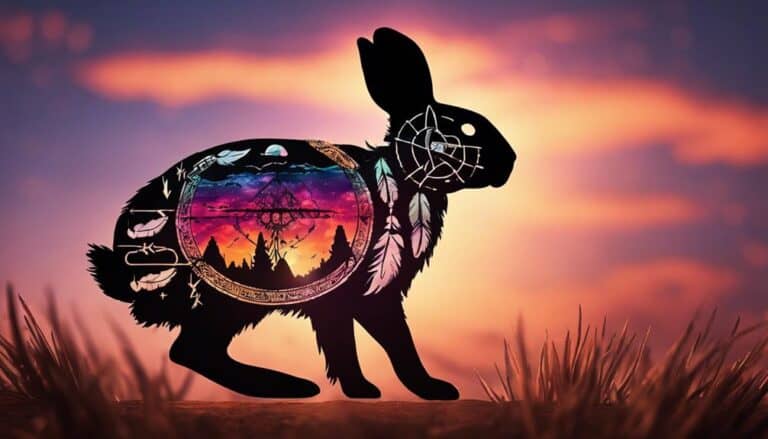In the intricate tapestry of mythologies and cultures, the rabbit emerges as a subtle yet potent symbol, weaving its way through various belief systems and traditions with nuanced meanings.
As you unravel the layers of rabbit symbolism, you'll uncover connections to fertility, prosperity, and protection, interwoven with themes of curiosity, intelligence, and new beginnings.
From the enigmatic allure of the Chinese zodiac to the whimsical tales of 'Alice's Adventures in Wonderland,' the rabbit beckons you to explore its multifaceted significance across the globe, hinting at a world of ancient wisdom waiting to be discovered.
Contents
- 1 Key Takeaways
- 2 Mystical Meanings of Rabbits in Mythology
- 3 Bunny Symbolism and Cultural Significance
- 4 Rabbit Symbolism in Native American Cultures
- 5 The Rabbit in Aztec and Mayan Mythology
- 6 Hare Symbolism in Ancient Egypt
- 7 Rabbits in Norse and Celtic Mythology
- 8 Rabbit Symbolism in Asian Cultures
- 9 Frequently Asked Questions
- 10 Conclusion
Key Takeaways
- Rabbits symbolize fertility, prosperity, and new beginnings in various mythologies and cultures.
- Native American and Indigenous cultures associate rabbits with wit, fertility, and heroism.
- Aztec, Mayan, and Egyptian mythologies link rabbits with fertility, festivities, and regeneration.
- In Asian cultures, rabbits represent gentleness, good fortune, and harmony with nature.
Mystical Meanings of Rabbits in Mythology

In the domain of mythology, rabbits have long held a revered status, embodying mystical significance across various cultures and traditions. These gentle creatures symbolize fertility, prosperity, and protection in ancient beliefs, signifying abundance and safety to those who honor them. From the lucky rabbit's foot dating back to 600 BC to being sacred to Aphrodite in early European history, rabbits have woven themselves into the fabric of human folklore, bringing luck and blessings to those who keep them close.
The symbolism of rabbits goes beyond mere superstition; it probes into the essence of care and nurturing. In different cultural contexts, emphasis is placed on the importance of caring for rabbits, highlighting the interconnectedness between humans and nature. By caring for these creatures, one not only invites their luck and protection but also learns the value of tending to all living beings with compassion and respect.
Bunny Symbolism and Cultural Significance
Symbolizing a myriad of virtues and ideals, the cultural significance of bunnies transcends mere folklore to embody profound symbolism across diverse societies and traditions. In various cultures worldwide, rabbits carry deep symbolic meanings that reflect essential aspects of life and spirituality. Here are four ways in which bunny symbolism holds cultural significance:
- Fertility and New Beginnings: Rabbits are often associated with fertility, symbolizing the cycle of life, growth, and the promise of new beginnings.
- Luck and Abundance: Across different mythologies, rabbits are seen as harbingers of luck and abundance, bringing prosperity and good fortune to those who encounter them.
- Respect and Agility: In African art and rituals, rabbit masks symbolize agility and respect, highlighting the importance of these qualities in cultural practices.
- Rebirth and Mythological Infinity: In Christian beliefs, rabbits are linked to themes of rebirth, resurrection, and new life, while the Aztecs viewed them as symbols of excess and infinity in their mythology.
Rabbit Symbolism in Native American Cultures
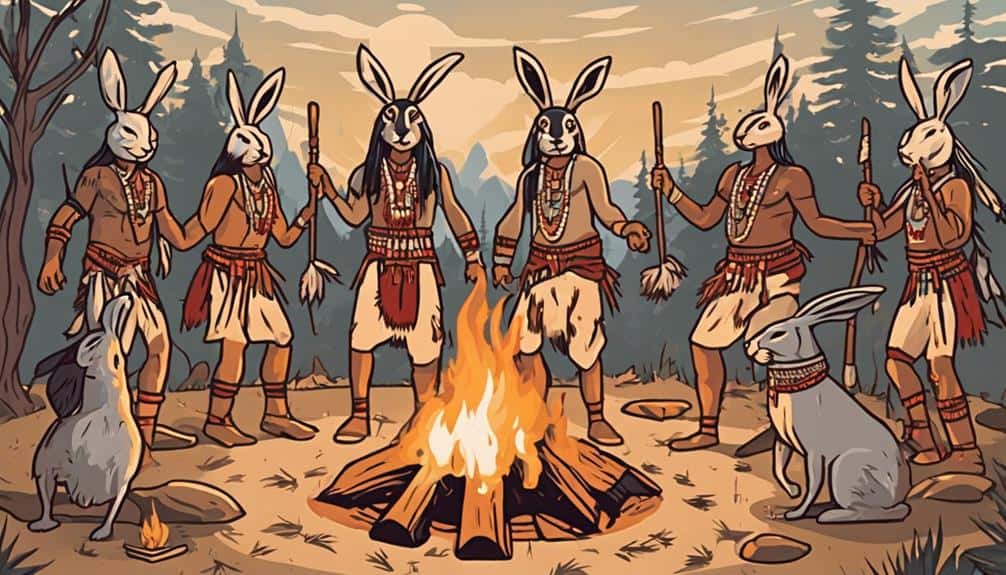
Exploring the rich tapestry of Native American cultures, the rabbit emerges as a revered symbol embodying wit, cleverness, and cultural significance. Within these cultures, the rabbit or hare often plays the role of a benign trickster figure, symbolizing intelligence and quick thinking. Tribes like the Ojibwe and Algonquin have stories featuring rabbit deities such as Nanabozho and Michabo, representing fertility and cultural heroism. Among tribes like the Hopi and Shawnee, rabbit clans exist, each linked to specific animal guardians traced along maternal family lines.
In Southwestern tribes, the rabbit holds particular importance as a symbol of fertility, rainfall, and prosperity. Stories within these tribes highlight the rabbit's cunning nature and the valuable lessons it teaches. Additionally, the iconic figure of Kokopelli, often portrayed as a rabbit, appears in various forms of Native American art. Kokopelli is associated with themes of fertility, hunting, and abundance, further emphasizing the rabbit's significance in Native American cultural narratives.
The Rabbit in Aztec and Mayan Mythology
In Aztec and Mayan mythology, the rabbit holds diverse symbolic meanings. Aztec culture associates rabbits with fertility, festivities, and even an act of sacrifice.
The Centzon Totochtin, a group of 400 rabbit gods in Aztec tales, exemplify the creature's importance in their mythology.
Aztec Rabbit Deity
What significance do the Aztec and Mayan cultures attribute to the Rabbit Deity in their mythological narratives?
The Aztec and Mayan cultures hold the Rabbit Deity in high regard, associating it with themes of fertility, abundance, and celebration. Through the presence of deities like the Centzon Totochtin and Macuiltochtli, rabbits symbolize various aspects of life and culture.
The Rabbit Deity's role in Aztec mythology embodies the consequences of over-indulgence, as seen through Macuiltochtli's governance. Additionally, the tale of a rabbit's noble gesture leading to its place on the moon, connected with the god Quetzalcoatl, showcases the divine presence attributed to rabbits in Aztec and Mayan beliefs.
Mayan Rabbit Symbolism
The reverence for rabbits in Mayan culture extends beyond mere symbolism, intertwining with notions of the moon, fertility, and prosperity within their rich mythological tapestry.
In Mayan mythology, rabbits weren't just ordinary creatures but were associated with the moon, fertility, and abundance. The Mayans believed that rabbit gods held significant roles in their culture, symbolizing renewal and prosperity.
Stories and legends featuring rabbit deities with specific attributes and powers were prevalent, showcasing the high regard in which rabbits were held. These creatures weren't only symbols of drinking and parties but also represented the cycle of life and the interconnectedness of nature.
Through their association with prosperity and renewal, rabbits played a crucial role in shaping the spiritual beliefs of the Mayan people.
Hare Symbolism in Ancient Egypt
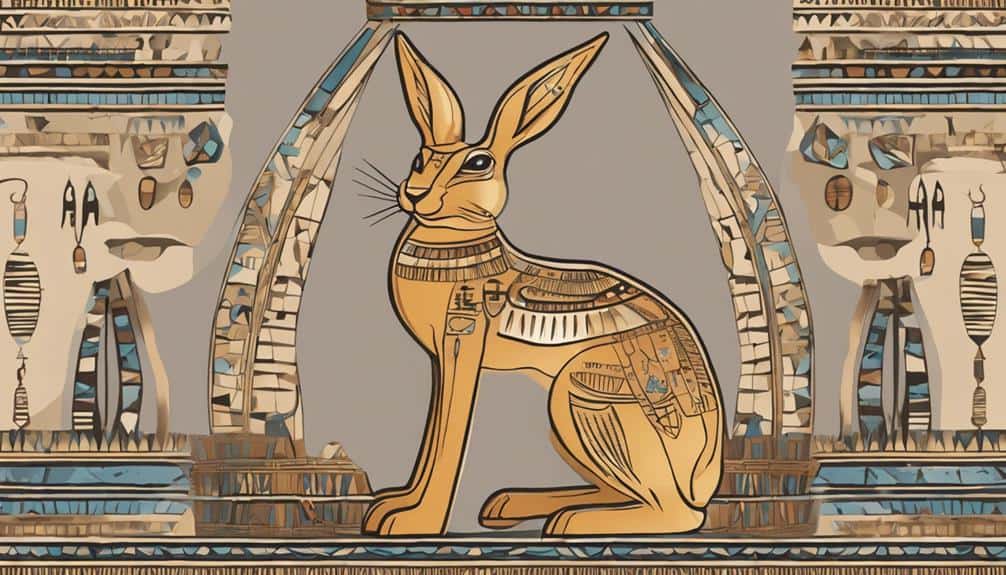
Celebrated in ancient Egypt for their symbolic representation of fertility and renewal, hares held a significant role in the mythological and cultural beliefs of the Egyptians. Here are four key aspects that shed light on the symbolism of hares in ancient Egypt:
- Association with Deities: Egyptians linked hares with important deities like Osiris, the god of resurrection, and Ra, the sun god, emphasizing themes of rebirth and renewal in their mythological narratives.
- Fertility and New Life: Hares and eggs were powerful symbols of fertility and new life in Egyptian culture, reflecting the cycle of life, death, and regeneration.
- Goddess Unut: The goddess Unut, often portrayed as part-snake or part-hare in Egyptian mythology, symbolized aspects of protection and fertility, further showcasing the significance of hares in Egyptian belief systems.
- Guardians of the Underworld: Hare deities were depicted as guardians of the underworld, underscoring their role in guiding souls through the afterlife and highlighting their importance in Egyptian spiritual beliefs.
Rabbits in Norse and Celtic Mythology
In Norse and Celtic mythology, rabbits held symbolic significance tied to fertility, renewal, and magical beliefs.
In Norse mythology, hares were linked to the fertility goddess Freya and were often featured in stories concerning the moon, representing cycles of renewal and growth.
On the other hand, in Celtic mythology, Druids used rabbits for divination, believing in their connection to fairies and shapeshifting abilities.
The Celts associated rabbits with goddesses like Eostre and Ceridwen, symbolizing renewal and fertility. They believed in the mystical shapeshifting abilities of rabbits and their ties to the fairy domain in their myths.
Rabbit Symbolism in Asian Cultures
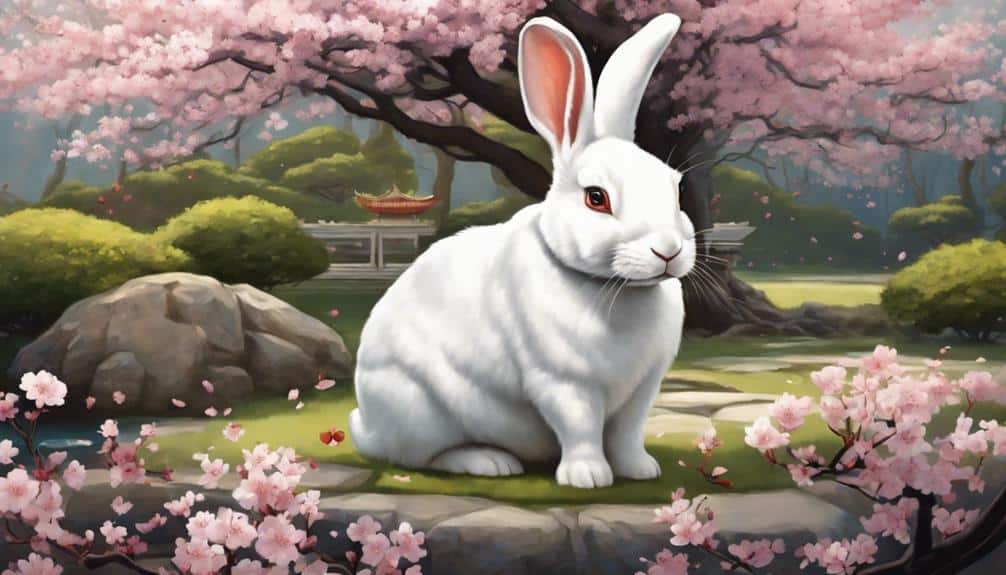
Exploring the rich tapestry of Asian cultures reveals a profound and intricate symbolism surrounding rabbits, encapsulating values of gentleness, honor, and prosperity intertwined with themes of fertility and harmony with nature.
When delving into Chinese astrology, rabbits are emblematic of gentleness, honor, and sensitivity, often associated with the moon's calming influence. Individuals born in the Year of the Rabbit are believed to possess compassionate, elegant, and peaceful qualities, reflecting the essence of these symbols in their personalities.
Moreover, in Japanese, Korean, and Vietnamese societies, rabbits are closely linked to concepts of fertility, abundance, and prosperity, showcasing their significance beyond Chinese culture. The symbolism of rabbits in Asia emphasizes their association with good fortune, longevity, and a harmonious relationship with the natural world, highlighting their enduring appeal and importance in various cultural contexts.
Frequently Asked Questions
What Does Rabbit Symbolize in Mythology?
In mythology, the rabbit symbolizes lunar connection, fertility, trickster tales, and more. It embodies speed, agility, magic, and transformation. Known for burrowing behavior and tied to Easter traditions, the rabbit is a versatile symbol.
What Is the Cultural Significance of the Rabbit?
In various cultures, rabbits hold significant cultural importance, influencing folk art, culinary traditions, and even folk remedies. Proverbs, ceremonies, and superstitions surrounding rabbits enrich traditions, with festivals and clothing reflecting their enduring symbolism.
What Is the Spiritual Significance of a Rabbit?
In spirituality, a rabbit embodies symbolic meanings of rebirth, intuition, and transformation. It connects you to mythical interpretations of fertility and new life. Rabbits serve as sacred animals, offering mystical insights and spiritual messages as animal totems.
What Is the Folklore About Rabbits?
Plunge into enchanting folklore about rabbits, from fabled bunnies to mythical rabbits. Explore bunny tales and hare myths, revealing legendary lagomorphs and their significance in various cultures. Discover the rich tapestry of rabbit legends.
Conclusion
As you explore the rich tapestry of rabbit symbolism in mythology and culture, you uncover a world of mystical meanings and cultural significance that transcends time and borders.
From the ancient civilizations of Egypt and the Aztec Empire to the folklore of Norse and Celtic traditions, rabbits have embodied qualities of fertility, protection, and intelligence.
How does the enduring presence of rabbits in global myths and legends inspire us to reflect on our own beliefs and values?


